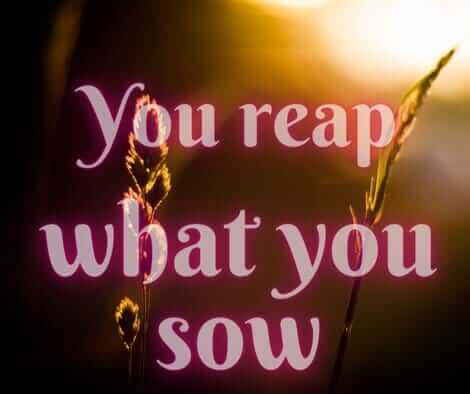Should I say, what you do with your life now, will affect the future? It’s like ‘Karma,’ you reap what you sow! And what goes always comes around.
In today’s Bible studies, we will discuss how the Bible teaches about giving and harvest in the context of “you reap what you sow.”
If you’re ready, let’s explore what the Bible tells us:
The Bible teaches us we are to give willingly and cheerfully, from a spirit of generosity. “Speak unto the children of Israel, that they bring me an offering: of every man that giveth it willingly with his heart ye shall take my offering” (Exodus 25:2)
You reap what you sow!
“Remember this: Whoever sows sparingly will also reap sparingly, and whoever sows generously will also reap generously. Each man should give what he has decided in his heart to give, not reluctantly or under compulsion, for God loves a cheerful giver” (2Corintians 9:6-7)
God does not measure our giving by the amount we give. He rewards us according to what is left after we give. Jesus said the tiny amount given by the widow was more significant than all the others because it was “all she had” (Luke 21:1-4)
Generous giving is proof of our love, faith, and maturity (2Cor 8:24)
A generous believer causes others to give thanks to God! (2Cor 9:11-12)
The poor need to give because they need God’s blessing to break the curse of poverty. The Macedonian Christians were in great poverty (2Cor 8:2), yet they gave liberally. They had learned that giving brings blessing and breaks the curse of poverty!
Jesus Christ, our ultimate example, became poor to bless us (2Cor 8:9).
You reap what you sow! Now, judge for yourself

Ecclesiastes 11:1
Cast thy bread upon the waters: for thou shalt find it after many days.
Per my research, this verse is talking about throwing the seeds used to grow grain for bread into the water, not the bread itself. Casting bread upon the waters demonstrates the law of sowing and reaping.
This practice came from flood irrigation in Egypt. While the Nile River flooded over its banks, the farmer would stand at the edge of the flooded field and pour wheat or barley seed into the overflowing water. While it may have looked like a foolish thing to do, it was quite wise.
What are you sowing? Bread or seed?
The water would carry the seed out onto the field and deposit it. The planter saved a lot of extra time and effort by dropping the seed into the flood. Solomon tells us to take life from the hand of God and to walk by faith despite life’s storms and tribulations. Learn to be a giver.
Take charge of your life: for you reap what you sow.
Not only does this study applies to the blessing we want to receive from God.
However, how you plan your life, personal development, and investment you sow today will significantly impact your tomorrow.
One man says, “if you fail to plan, you’ll plan to fail”
Although God is our provider, sometimes he wants us to do our part.
Do you know why God always wants us to do good? He wants us to live the best life ever! Read more Bible verse on you reap what you sow from here.
For motivation: you reap what you sow
God is keeping a record of all we do for him, including our giving.
“And a book of remembrance was written before him for them that feared the LORD.” (Malachi 3:16b)
Be a giver and watch the Lord surprise you in every aspect of life.
PRAYER :
“LORD, grant us the grace to be givers. Let wisdom guide us to sow many seeds today, which will yield abundance tomorrow. AMEN!!
